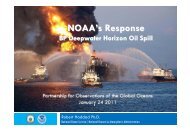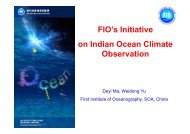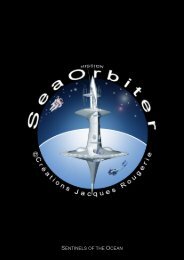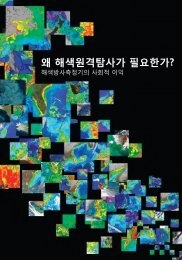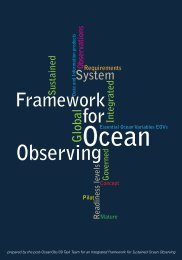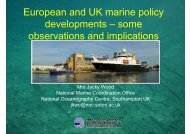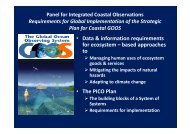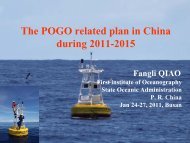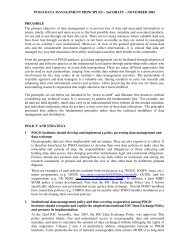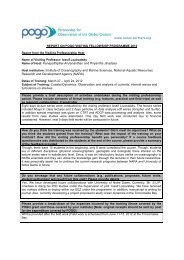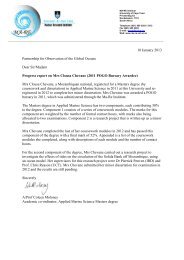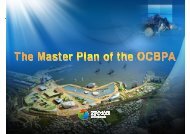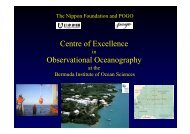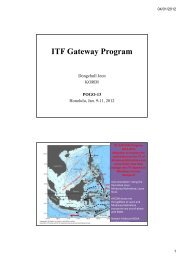NF-POGO Centre of Excellence Year 2 Report
NF-POGO Centre of Excellence Year 2 Report
NF-POGO Centre of Excellence Year 2 Report
- No tags were found...
Create successful ePaper yourself
Turn your PDF publications into a flip-book with our unique Google optimized e-Paper software.
for proper utilization and interpretation <strong>of</strong> such complex information.The Programme was made available to 25 participants from five Latin America countries,including four from Argentina, 15 from Brazil including two from INPE and four from IEAPM,one from Ecuador, three from Mexico and two from Venezuela.Instructors who participated in the Training Programme included:Dr. Milton Kampel (Instituto Nacional de Pesquisas Espaciais, Brasil) – Local OrganizerDr. Heather Bouman (Oxford University, England),Dr. Robert Frouin (Scripps Institution <strong>of</strong> Oceanography, USA),Dr. Vivian Lutz (Instituto Nacional de Investigación y Desarrollo Pesquero, Argentina),Dr. Milton Kampel (Instituto Nacional de Pesquisas Espaciais, Brasil),Dr. Roberto Millan (Univ. Autónoma de Baja California, Mexico),Dr. Rodolfo Paranhos (Universidade Federal do Rio de Janeiro, Brazil)Dr. Gerald Plumley (Bermuda Institute <strong>of</strong> Ocean Sciences, Bermuda),Dr. Silvana Vianna Rodriguez (Univ. Federal de Rio de Janeiro, Brazil),Dr. Eliane Gonzalez Rodriguez (Instituto de Estudos do Mar Almirante Paulo Moreira, Brazil)Dr. Wanderson F. de Carvalho (Instituto de Estudos do Mar Almirante Paulo Moreira, Brazil)A full report <strong>of</strong> the Brazil Training Programme is provided in Appendix 6.4.0 The Future <strong>of</strong> the <strong>NF</strong>-<strong>POGO</strong> C<strong>of</strong>E4.1 <strong>Year</strong> 1 Changes that Were Implemented in <strong>Year</strong> 2After year 1 was complete, private exit interviews were held with each scholar. One <strong>of</strong> the mainquestions asked was: „how do we improve the programme?‟ After the scholars left, BIOSfaculty held discussions focused on how to improve the programme. Overall, several changeswere implemented in the year 2 programme. The changes are outlined below and are followedby comments about how these changes were perceived in year 2.1. The deadline for student applications was moved forward. This was necessary because <strong>of</strong>difficulties involved in getting Bermuda Work Permits and Transit Visas (i.e., in manycases, it was seemingly impossible to get one before the other without a lot <strong>of</strong> extrawork).This was a very positive change.2. Several Scholars invited to participate decided not to attend. This was invariably a result<strong>of</strong> „family situations‟, almost always involving young children or aging parents. Theapplication form for year 2 was modified to include questions such as „how willparticipation in the <strong>NF</strong>-<strong>POGO</strong> C<strong>of</strong>E adversely affect your family life, especially if youhave young children or aging parents? Other questions were added to make sure Scholarsunderstand that they cannot commute weekly between Bermuda and their home countryto maintain a salaried position.Again, this was very positive. Only one Scholar withdrew after being asked toattend (she had not yet finished her MS degree and had anticipated she would bethrough).3. Scholars were asked to conduct an „independent study‟ during the second half <strong>of</strong> theC<strong>of</strong>E in year 1. This did not work as well as anticipated. Students were much moreinterested in learning skills than in conducting research. For instance, they would ratherconduct 5-10 short „experiments‟, each involving a new skill, than to use one skillrepeatedly in order to get publication quality results. For year 2, the decision has beenmade to increase the duration <strong>of</strong> the modules (from roughly 2 weeks to 3 weeks) and to14



